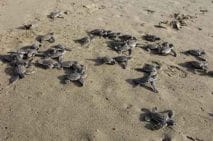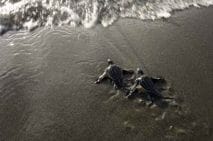In December 2006, 103 leatherback turtle eggs were laid on Karon Beach Phuket and to date 76 of them have hatched.

It was the first time in 10 years a leatherback had been spotted laying its eggs on this beach so the sight of so many hatchlings making their way instinctively to the sea was greeted with joy by watching locals and residents. How many of them will survive and return to lay their own eggs is unknown but some estimates are as low as 1%.
Karon Municipality officials had the task of recovering the eggs as local villagers had taken them all in hopes of selling them as a delicacy. All but 2 broken eggs were recovered and taken to incubate at the Phuket Marine Biology Center (PMBC).
Ittipol Sangkaew, Deputy Mayor of Karon Municipality, explained that the eggs sell for about 60 baht each. “But after we explained to the villagers that we should let the eggs hatch so that the next generation can see real, live sea turtles – not just pictures of them – they agreed to give them back,” he said. “When I was young I saw turtles very often, but I haven’t seen this kind of turtle for 10 years.”
According to Phuket Marine Biological Center (PMBC) Veterinarian Sontaya Manawattana “About 80% of the eggs from the nest will hatch and we release the turtles at Karon Beach, where the eggs were laid, the same day that they hatch. The turtles will remember where they were released and will come back to lay eggs at Karon Beach again, if they survive”

As often happens in areas where there is human population the turtles are released in the evening so that they are able to use natural light to navigate and they are also less exposed to predators than in the daytime.
“The chance that these turtles will survive and come back to lay eggs here is small because after they go into sea they might be eaten by another animal, but that is the cycle of life for leatherback turtles. We try to care for them after they hatch but we haven’t had success with this type of turtle. They will die if we don’t release them into the sea,” K. Sontaya added.
Normally leatherback turtles only begin to lay eggs after they have reached reproductive age at around 15 to 20 years old and after laying the eggs take around 60 days to hatch.
At a time when turtles in general, and leatherbacks in particular, are under serious threat it is particularly pleasing to witness this return to an old nesting site and to see the next generation set off into the blue.
Turtles are known to lay eggs at only 3 beaches in Phuket: Mai Khao Beach, Nai Harn Beach and Karon Beach. During the past 10 years, however, fewer turtles have been laying eggs on Phuket beaches because the beachfronts have become occupied by people, and businesses have been built nearby.
Find out more about turtles in our Turtle Creature Feature
Learn more about local diving here:Phuket Dive Sites
